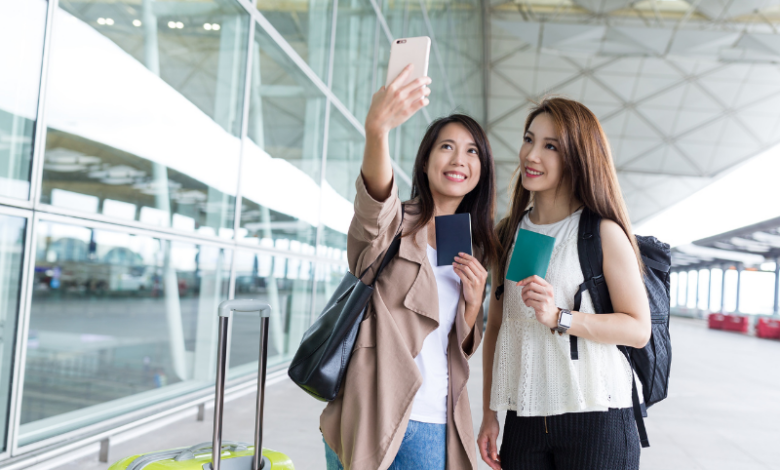How Social Media is Impacting Travel Industry in the US

In today’s interconnected world, social media has emerged as a powerful force reshaping industries across the globe. Among the sectors profoundly influenced by this digital revolution is the travel industry. Gone are the days of relying solely on brochures and travel agents to plan trips; instead, travelers now turn to social media platforms for inspiration, recommendations, and even bookings. This article explores the multifaceted impact of social media on the travel industry in the United States, delving into the ways it has revolutionized the entire travel experience, from discovery to post-trip reflections.
Social Media: A Catalyst for Change
Platforms like Instagram, Facebook, Twitter, and TikTok have become virtual playgrounds for travelers, where they share their adventures, seek inspiration, and connect with like-minded individuals. These platforms serve as powerful catalysts for change within the travel industry, fueling a shift towards experiential and authentic travel experiences. Platforms like InstaNavigation can help aspiring travelers through user guides that explain how to navigate the platform’s features to find travel content aligned with their specific interests. The visual nature of platforms like Instagram, in particular, has transformed the way travelers choose destinations, hotels, and activities, as stunning images and captivating stories sway their decisions.
Influencer Culture: Shaping Travel Aspirations
The rise of influencer culture has further amplified the influence of social media on the travel industry. Travel influencers, with their large followings and curated content, have become tastemakers, shaping the aspirations and preferences of millions of followers. From luxury resorts to off-the-beaten-path destinations, influencers wield considerable influence in steering consumer behavior and destination preferences, spanning from high-end resorts to less-traveled locales. Brands strategically collaborate with influencers to endorse their offerings, capitalizing on their credibility and wide reach to engage a larger demographic.
Destination Discovery: The Role of Social Media Platforms
Social media platforms serve as virtual travel guides, offering a plethora of destination options and insider tips. Hashtags, geotags, and location-based features enable users to discover hidden gems and popular attractions across the United States. Platforms like Pinterest and YouTube are particularly valuable for travel planning, offering curated boards and travel vlogs that provide a glimpse into destinations around the world. Additionally, user-generated content fosters a sense of trust and authenticity as travelers seek recommendations and reviews from fellow users.
Personalized Experiences: Tailoring Travel Itineraries Through Social Media
One of the most significant benefits of social media in the travel industry is the ability to personalize travel experiences. Through targeted ads and curated content, travelers receive tailored suggestions based on their interests, preferences, and past behavior. Whether it’s a weekend getaway, family vacation, or solo adventure, social media algorithms help Americans find the perfect travel experiences within the US that match their preferences
User-Generated Content: Harnessing the Power of Authenticity
User-generated content (UGC) has become the foundation of social media marketing in the travel industry. Travelers share their experiences through photos, videos, and reviews, providing authentic and relatable content that resonates with audiences. Hotels, airlines, and tour operators leverage UGC to showcase their offerings, tapping into the storytelling potential of real travelers. By featuring user-generated content on their websites and social media channels, brands foster a sense of community and authenticity, establishing trust with potential customers.
Social Media Advertising: Targeting and Engaging Travelers
Social media advertising has become as a potent tool for travel brands to reach and engage with their target audience. Through sophisticated targeting options, advertisers can tailor their campaigns based on demographics, interests, and online behavior, ensuring maximum impact and ROI. Platforms like Facebook and Instagram offer a range of ad formats, from carousel ads showcasing multiple destinations to immersive video ads that transport viewers to far-off lands. By capitalizing on the visual and interactive nature of social media, travel brands in the US can create compelling ad experiences that inspire action.
Customer Service and Feedback: Real-Time Communication Channels
Social media platforms serve as real-time communication channels for travelers seeking assistance or sharing feedback. Whether it’s addressing customer inquiries, resolving issues, or soliciting feedback, brands use social media to provide responsive and personalized customer service. The immediacy of social media enables brands to address concerns promptly, enhancing the overall customer experience and fostering loyalty. Moreover, feedback shared publicly on social media serves as valuable insights for brands, informing product development and service improvements.
Challenges and Opportunities: Navigating the Social Media Landscape in the US Travel Industry
While social media offers numerous opportunities for the travel industry, it also presents challenges that must be navigated effectively. From managing brand reputation to addressing privacy concerns, travel brands must approach social media with caution and foresight. Additionally, the ever-changing nature of social media algorithms and trends requires brands to stay agile and adaptable, continuously evolving their strategies to stay ahead of the curve. Despite these challenges, the transformative power of social media in the travel industry cannot be overstated, presenting unparalleled chances for brands to engage with travelers and spark memorable adventures.
Conclusion: Embracing the Future of Travel in the Digital Age
In conclusion, social media continues to transform the travel industry in the United States, offering new opportunities for discovery, engagement, and personalization. From inspiring wanderlust to finding dog-friendly hotels at their destination, social media plays a pivotal role in shaping the way Americans explore and experience their own country. As technology evolves and consumer preferences change, travel brands in the US must continue to adapt their strategies to harness the full potential of social media and meet the evolving needs of American travelers.